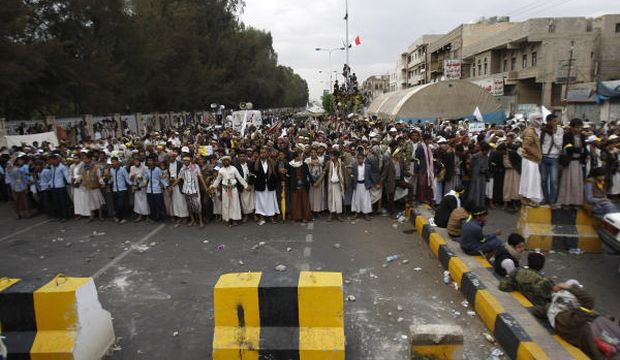
Shi’ite Houthi protesters block a main road leading to the airport during a protest in Sana’a, Yemen, on September 7, 2014. (AP Photo/Hani Mohammed)
Sana’a, Asharq Al-Awsat—More Houthi protesters were killed by government forces in the Yemeni capital of Sana’a on Tuesday, according to reports, as fighting between the movement and Yemeni army units continues in the province of Al-Jawf.
According to wire service reports, four members of the movement were killed when Yemeni security forces opened fire on protesters marching to the prime minister’s office, while 10 more were wounded.
The Houthis have been occupying protest camps across Sana’a since mid-August, demanding the resignation of the government and the restoration of fuel subsidies. So far, attempts to mediate have failed, with the Houthis rejecting a compromise proposal offered by Yemeni President Abd Rabbuh Mansur Hadi last week.
The latest development follows on the heels of the death of at least two Houthi protesters on Sunday, after riot police attempted to clear protesters from the road to Sana’a airport.
Meanwhile, elsewhere in Yemen, dozens of people were killed and injured as fierce fighting continued in Al-Jawf province between Houthi rebels and pro-government fighters.
The governor of Al-Jawf, Sheikh Mohammed Bin Salem Al-Sharif, told Asharq Al-Awsat that “the war with the Houthis will end in a matter of days and we will then move to Saada province.”
He claimed that more than 80 Houthis were killed and hundreds injured in government air strikes in the Al-Gheel and Al-Masloub areas in the last few days.
In response to the ongoing unrest, President Hadi held a meeting on Sunday with senior military officers and the governors of the provinces of Al-Jawf and Ma’rib.
Al-Jawf governor Sharif said: “President Hadi issued orders to the ministries of interior and defense and to the air force to support the [Higher] Security Committee with military equipment and personnel in order to destroy the Houthis and expel them from Al-Jawf province, and to secure the area of Majzar, which is part of the oil-rich province of Ma’rib.”
The governor alleged that Houthi fighters were using modern weapons stolen from army bases in Saada and Amran, adding: “Hundreds of residents fled their villages in the Al-Gheel and Al-Masloub areas, which had become deserted. They were living in difficult conditions amid the absence of local and international humanitarian organizations.”
Al-Jawf, which is adjacent to Saudi Arabia, has approximately 500,000 inhabitants. Four months ago, armed clashes erupted in the province between the residents and the Houthi rebels, but remained sporadic. The clashes were renewed on July 29 and have grown in intensity since last week.
A report issued on Monday by the International Crisis Group warned that the Houthis’ move in Al-Jawf was seen as an attempt to spread the movement’s power and influence across northern Yemen, and force the government to reconsider plans to divide the country into six new autonomous, federal regions.
Back in Sana’a, Houthis rebels closed the entrances of the city to government and army vehicles. The pro-Houthi Al-Maseera TV channel said the decision was part of what it called an “escalation” of the protests against the government, and a response to attempts to disperse the Houthis’ protests on the airport road in Sana’a over the weekend.
The Higher Security Committee said Houthis had erected a large number of tents on the airport road in the capital, disrupting traffic. The Committee also accused the Houthis of blocking the roads to the Ministry of Electricity, and the Ministry of Communications and Information Technology, accusing them of forcing staff out of the buildings, according to Yemen’s official news agency.
Following the failure of government efforts to clear the Houthis off the airport road, President Hadi dismissed the commander of the Special Forces, Maj. Gen. Fadhil Al-Qawsi, on Monday. Reports said Interior Minister Maj. Gen. Hussein Al-Tarb appointed Maj. Gen. Mohammed Mansour Al-Ghadraa in place of Qawsi.
